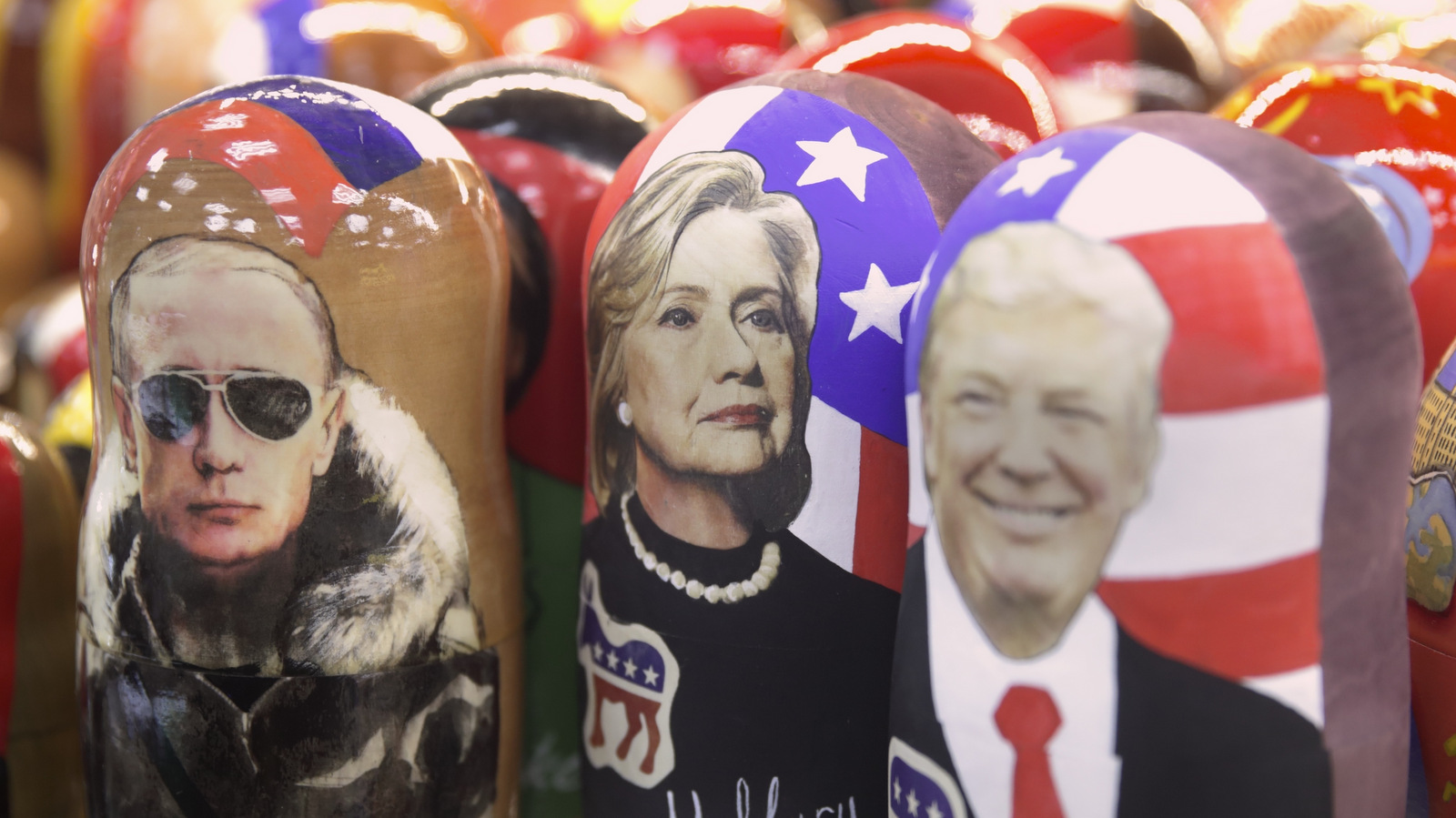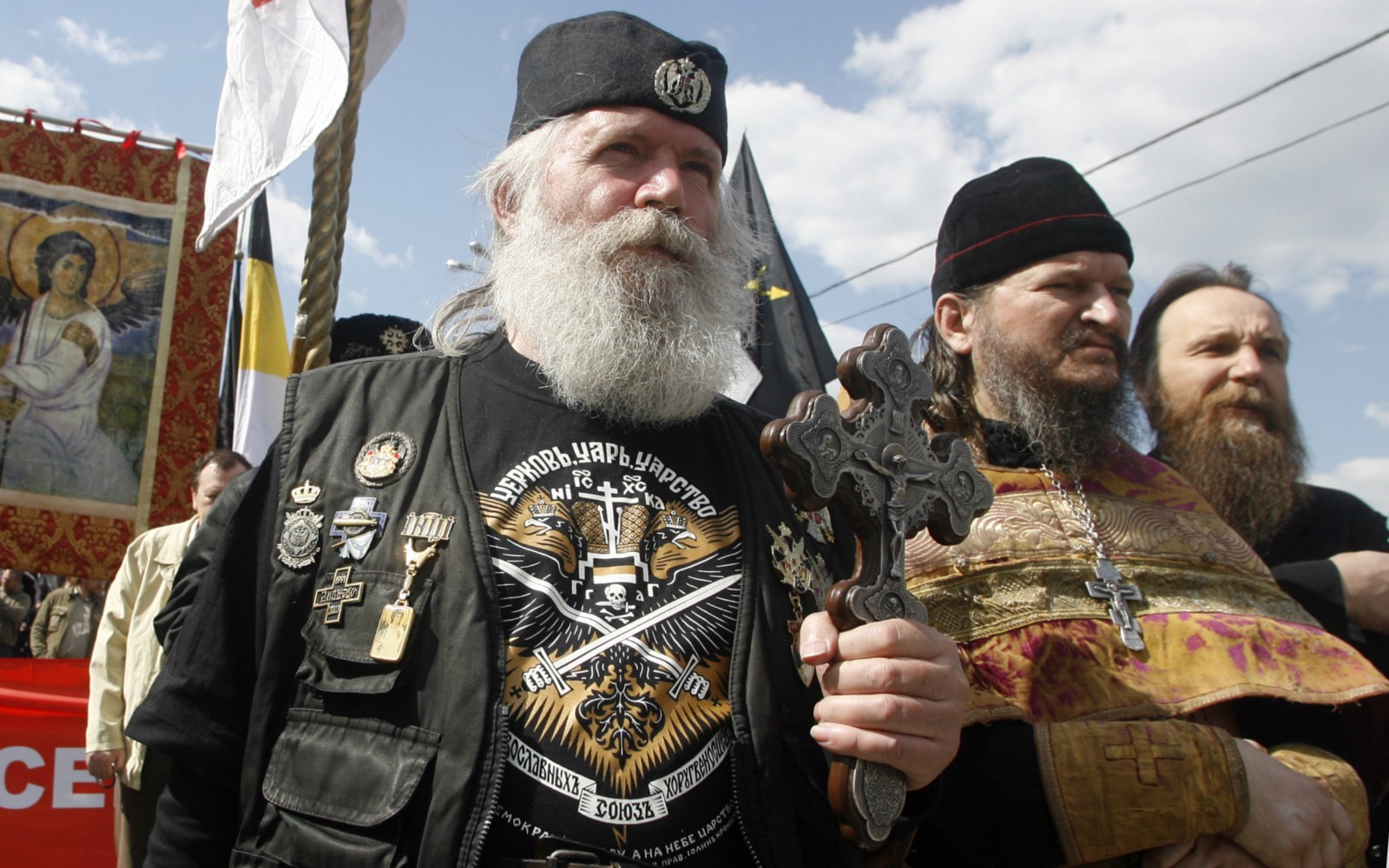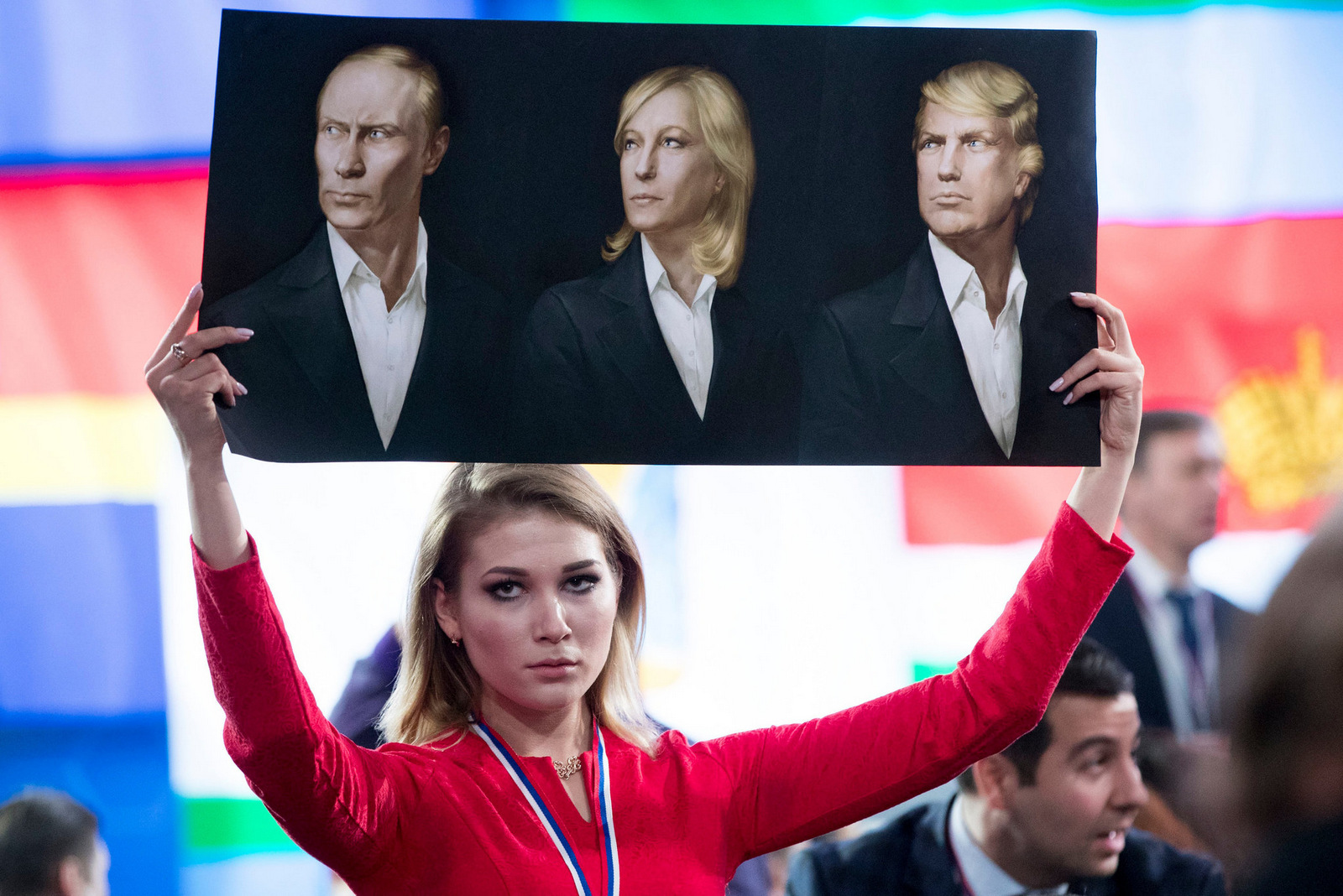
Traditional Russian Matreskas depicting Vladimir Putin, Hillary Clinton and Donald Trump displayed in a shop in Moscow. Nov. 8, 2016. (AP/Pavel Golovkin)
NEW YORK (Interview) —Neoliberal capitalism has failed the vast majority of Americans. It has increased inequality, fostered austerity, destroyed the environment and fomented wars.
Reactionary right-wing politics have largely succeeded in filling this ideological vacuum, embodied by the election of Donald Trump as President of the United States of America.
Donald Trump’s success in galvanizing white identity politics has promoted a surge in racial violence and Islamophobic street demonstrations across America. What’s more, it has emboldened leading right-wing agitators and politicians.
The glaring corruptions of neoliberalism and the rise of right-wing populism have contributed to the erosion of notions of the enlightenment that are tethered to liberalism, including freedom, equality, democracy and the primacy of truth.
The opportunities afforded by the Internet in conjunction with a growing distrust of corporate media, which has been repeatedly exposed for its omissions and falsehoods, have promoted the development of a range of independent media platforms, as well as the plague of “fake news.”
Within this de-monopolized media and propaganda landscape, it is easy to get lost. Our airwaves and social media feeds overflow with information that is often quite alarming and false.
So who or what can we trust?
In order to better understand the nuances of the current political landscape, as well as the increasing yet often propagandized role of Russian politicians and media in shaping narrative and political trends, I interviewed lecturer at Portland State University, journalist and author of Against the Fascist Creep Alexander Reid Ross and geopolitical analyst and the founder of StopImperialism.org, Eric Draitser.
MintPress News (MPN): How would you characterize the state of the left and the changes it has endured in the United States today?

Eric Draister, founder of stopimperialism.org.
Eric Draitser (ED): We have a situation in the United States in which there is very little that can be called left politics. The left is factionalized, which is not anything new necessarily, but there is no ideological clarity, alignment, or a Soviet Union around which the majority of the left, to varying degrees, can rally in an ideological sense. All that is gone. Instead, there is the primacy of capitalism and a hegemony of neoliberal finance.
It is against that backdrop that you see a lot of leftist academics, intellectuals and activists who have in many ways abandoned a real class analysis in favor of a loosely defined politics of opposition. Within this mindset, everything that opposes the United States, Israel, the Saudis or the EU is automatically good and should be supported irrespective of its qualities.
The right-wing and today’s fascists, i.e. the so-called “alt-right” in the United States position themselves as anti-establishment and anti-imperialist by virtue of an opposition to neoliberal capitalism. Theirs is not an opposition to capitalism nor is it an opposition to imperialism. It is an opposition to the unique set of conditions that we see today.
MPN: How do you differentiate between real anti-imperialists on the left and those who are posing on the right?
ED: Anti-imperialists do not advocate non-American forms of imperialism. For example, the Duginists, of the Alexsandr Dugin school of “anti-imperialism,” advocate for Russian imperial revanchism, which is Russian expansion with the goal of creating a Eurasian empire under the auspices of Moscow. That is really the Eurasianist vision that Dugin outlines in the fourth political theory and it is to a large extent what these so-called “anti-imperialists” are advocating for, whether consciously or unconsciously.
There are many nodes in this Duginist network, including many organizations, both online and in brick and mortar form in the U.S. and Europe, and they have a tremendous amount of influence within Russian media. Because I have read Dugin and am intimately familiar with a large portion of the alternative media landscape, it has become for me second-nature to recognize fake anti-imperialists. I know the telltale indicators, the buzzwords and their ideological framework.
But even if one is not as versed about Dugin or that history, people who simultaneously call themselves “anti-imperialists” but advocate against refugees, or those who have no comment about any of the violations committed by countries that are not empire are obviously fake anti-imperialists coming from the right. For example, look at the “anti-imperialists” lauding the Philippine dictator [Rodrigo] Duterte, as they ignore his massacres of innocents in the streets. Why? Because he poses nicely with the Chinese and tells Trump to go to hell.
MPN: Who on the left is susceptible to the allure of fascism? What are some indications or patterns that you recognize?

Alexander Reid Ross, author of Against the Fascist Creep.
Alexander Reid Ross (ARR): Authoritarians and elitists are vulnerable in the affective sense, because they think in grandiose terms and often put ideology before experience. This often creates a perverse idealism through which the subject alone can understand fully the clean break that must be made with the modern world. Collectivists and individualists alike can be lured into this trap, ignoring common sense and the interests of most people in favor of their grand idea.
At the same time, the romantic idealism tied to ecology and biocentrism can lead one toward essentialist conceptions of gender, ethnos, race and nation on the basis of place-based thinking. Lastly, anti-colonial struggles can even creep toward fascist alliances where they understand their liberation in terms of strict ultranationalist patriarchy – e.g., Qaddafi’s enlistment of Skorzeny’s Paladin Group and Nassr’s deployment of Nazi war criminals like Johann von Leers to create anti-Semitic propaganda.
MPN: What exactly is a red-brown alliance and do you see it forming? Where? What is a good way to combat this trend?
ARR: A red-brown alliance is a political formation that includes leftist and fascist forces. I see a number of red-brown alliances forming today, particularly in the field of political geography. A number of far-right groups view the modern-day axis of Syria, Iran and Russia as a kind of international counterweight to the North Atlantic Treaty Organization (NATO), which has always been seen by fascist groups as a kind of nemesis led by the nations that defeated the Rome-Berlin axis in 1945.
Authoritarian leftists often view that same axis of powers between Syria, Moscow and Iran as a convenient ally in their declared struggle against U.S. imperialism and its partner in the state of Israel. To combat this kind of mobilization of left and right against liberal democracy, we must promote principled alternatives to the world-systems offered up by both extremes and liberals.
MPN: What is Russia’s status today and how is it portrayed in the United States?
ED: First and foremost, we must reject the empire’s narrative that Russia is essentially no different from the status it had during the Cold War: that it is the main geopolitical rival of the U.S. and is an aggressive imperialist nation that seeks to swallow up all of its neighbors out of some inherent bloodlust or desire to destroy Reagan’s “city on the hill.” This type of narrative is promoted by the Democratic Party and the neocons of the Republican Party. Anybody on the left needs to take a long hard look in the mirror if they find themselves parroting the ruling class’s talking points on Russia.
It is also important to examine whether Russia actually fits what we understand to be an imperialist power. If we take the standard definition of imperialism as put forth by Lenin in “Imperialism, the Highest Stage of Capitalism,” I would say that Russia does not fulfill the definition of an imperialist power: it does not monopolize finance capital, it does not use financial power as a means of power projection or acquiring raw materials.
If anything, Russia is the inverse of that, Russia is a raw material exporter and little more. So in that regard, Russia is almost more colony than colonial power. Though I do believe it is a false impression if you think Russia is merely just an oppressed global south nation like any other, it is certainly not.
Related: The Demonopolization Of Deceit: Fighting For Narrative In The Age of Trump
Russia’s foreign policy imperatives are basically to re-establish itself as a global power and to leverage the advantages that it does have in order to compensate for its deficiencies. Russia has very little true economic power globally: it is not a manufacturing or trading power. Russia’s influence and power rests in its ability to export energy and that is precisely how it crafts its foreign policy.
The other economic strength that it has is exports of weapons and military technology, Russia being the number two global supplier of arms behind the U.S. Russia’s power projection rests not in its ability to conquer territories, which is the way imperialist powers are traditionally thought of, nor does it rest in Russia’s ability to influence using the full-spectrum dominance approach that Washington has maintained for decades. Rather, Russia is trying to maneuver Brzezinski’s geopolitical chessboard using its advantages where it can, so that it can pursue its self-interests.
The problem rests in the fact that a leftist political outlook, the anti-imperialist, anti-fascist outlook cares not at all for Russia’s self-interested goals but about ideological principles. In this way a true anti-imperialist, anti-fascist, anti-capitalist perspective on the left is at odds with the “Russia is great” version of leftist politics.
MPN: What has been Russia’s role in the far-right surge in the United States and Europe?
ARR: Certain far-right actors in the Russian government have a lot of power and sponsor and support the same causes that the far-right does in the U.S. or in France. That the two cross-fertilize, for instance at World Congress of Families conferences, is as natural as it is disgusting.
Generally, Alexsandr Dugin’s Eurasianism has provided the White Identitarian movement of Europe and the U.S. with a common rubric, enabling them to engage in more coordinated campaigns, while Putin has provided the model for an authoritarian-conservative world-system in opposition to “Atlanticist” liberal democracy.
Dugin works to cultivate international ties among far-right and far-left groups according to his fascist geopolitical ideology masquerading as “anti-imperialism.” One of Dugin’s patrons, Konstantin Malofeev, is a big player in international far-right movements, as is Vladimir Yakunin, who is one of Putin’s comrades from Petersburg. The far-right party, Rodina, has also worked to integrate ultranationalist movements under the auspices of “national conservatism.”

Alexander Dugin, the leader of the Eurasian Movement (far right) takes part in a Russian nationalists’ rally in support of Serbia in Moscow, Russia, Sunday, April 27, 2008. (Photo: Mikhail Metzel/AP)
Putin’s support for the Front National is important, to the tune of a multi-million dollar financial agreement, while Russian support for other far-right parties and groupuscules has brought them access to financial resources through business alliances, communications through integrated platforms like Katehon or the World National-Conservative Movement, and media attention through venues like Sputnik and RT.
Richard Spencer published his early article throwing the alt-right’s support behind Trump in Katehon first, signifying the authoritarian conservative world-system that he supports, against NATO. Sputnik and RT provide platforms to Duginists, while downplaying Trump’s mistakes and amplifying those of liberals.
At the end of the day, although Russian media tends toward certain anti-liberal positions tied to state-run industries and Kremlin-backed ideology that further the interests of an authoritarian conservative world-system, it is important to recognize the media bias of liberal democratic systems as well. A balance must be struck between honest comprehension of current events as they happen and problematic interpretations that feed into, and are often fed by, the interests of one or another party. This means maintaining a critical relationship with the powers that be and opening space for independent thought, which is the basis for any truly democratic society.
MPN: How has Russian media affected the recent political upheavals in Europe and the U.S.?
ED: The politics of opposition have become very pervasive in both left and right circles. And it is that outlook that Russian media has seized upon.
The Russians have understood, perhaps correctly from their perspective, that there is very little to be gained from the far-left. With the fascists they can provide indirect funding through third-parties and indirect public relations through their media apparati.
Take Britain – Corbyn did not need RT to have a major electoral breakthrough. On the other hand, Le Pen, Brexit and most likely Trump were nowhere without the Russians. Brexit would likely have failed without the help of third-parties that have very nefarious ties to the Mercer network in the U.S. and some elements in Russia. So again, Russia is able to win when it backs the far-right, it does not win when it backs the far-left. We saw that in Putin’s failed attempt to woo Syriza in Greece. They are succeeding with the far-right, so why would they change?
ARR: Basically, oligarchs like Malofeev work to fund think tanks linked to people close to Russian geopolitical theory, which then produce the “spin” on certain stories implemented by a second tier of news sites. For instance, Leonid Reshetnikov, who was in charge of the Russian Institute for Strategic Studies think tank that allegedly created the Kremlin’s strategy for influencing the 2016 elections, is on the board of Malofeev’s Katehon think tank, for which Eurasianist fascist, Alexsandr Dugin, performed the duties of editor-in-chief.
Dugin’s thought pieces are read by journalists and editors with other sites like Fort-Russ, which claims to receive some millions of views per month. RT and Sputnik pick up stories and writers from sites like Fort-Russ and Katehon, elevating the Kremlin’s “spin” to more and more users. They then bring on leftist journalists from North Atlantic countries in order to make that spin more attractive to larger audiences in the West.
MPN: How does Russian media cater simultaneously to the left and to the right?
ED: The influence of Russian media has nothing to do with television ratings and everything to do with influencing the discourse on the far-left and far-right. The idea being that the Russian media fill the spaces vacated by the corporate media.
There is very little that can be seen as left-wing mainstream publications in the United States. I suppose the most popular is The Nation and the readership is still a fraction of that of the news in the U.S. Similarly, with the far-right. Against this backdrop you have a massive push by Russian media to capture the far-left and far-right.

A journalist holds a poster with portraits of President Vladimir Putin, Marine Le Pen and Donald Trump prior to Putin’s annual news conference in Moscow. Dec, 2016. (Pavel Golovkin/AP)
They do this by elevating voices of the far-right libertarian, anarcho-capitalist milieu. It is very pronounced and very significant. Why? Because what they seek to do is essentially unite left and right, red and brown, ideologically as a bulwark against the U.S. establishment, against the empire. These media outlets want to cultivate an opposition that exists online, a “fifth column.”
The reason for this is not only to further Russia’s political interests, but also to create a parallel to what the U.S. has in Russia. In Russia, the bourgeois liberal is anti-Putin/pro-U.S., anti-Russian media/pro-Western media. And so what the Russians seek to do is to create their variant of a “fifth column” (which is the term they use in Russian media to refer to those anti-Russian liberals) to create anti-U.S. liberals, communists, socialists and fascists. They want to be able to cultivate their own online army. And they are succeeding very well.
As a result, you have a mass of people on the left who will instinctively believe anything that Russian media says and reject western news. Ultimately, that means that the Kremlin controls the narrative entirely when it comes to those types of people, just like the military-industrial complex and the intelligence community control the narrative when it comes to Western corporate media.
The tiny segment on the left that is cognizant of these trends is fighting this two-front war every day; against the corporate media, i.e. the New York Times, the Washington Post, Fox News, etc. while simultaneously rejecting all those people who present the Russian narrative as the gospel truth.
That is why it is so lonely to make this argument.
Source Article from http://www.mintpressnews.com/the-modern-left-right-and-the-russia-connection/229534/
Related posts:
Views: 0
 RSS Feed
RSS Feed

















 July 7th, 2017
July 7th, 2017  Awake Goy
Awake Goy 





 Posted in
Posted in  Tags:
Tags: 
















